Overview
This article highlights the vital role that medical nexus letters play in securing VA claims for veterans. We understand that navigating the claims process can be daunting, and these letters are essential in connecting a veteran's health condition to their military service. A well-crafted nexus letter can significantly improve the chances of a successful claim or appeal.
It's common to feel overwhelmed, but knowing that a nexus letter is backed by evidence showing the relationship between service and health issues can provide some reassurance. We’re here to help you understand the significance, requirements, and the process of obtaining these letters. Remember, you are not alone in this journey; support is available to guide you through each step.
Introduction
Navigating the complexities of VA claims can feel overwhelming for veterans. We understand that obtaining essential documents like medical nexus letters is often a significant hurdle. These letters are crucial links between a veteran's health conditions and their military service, and they can determine the success of disability claims. It's common to feel lost in the intricacies of acquiring these letters, leading to the question: how can you effectively streamline this process?
This article delves into ten key facts about medical nexus letters. Our goal is to offer valuable insights and practical guidance, empowering you in your pursuit of the benefits you rightfully deserve. Remember, you are not alone in this journey, and we're here to help.
Turnout: Streamlining the Process of Obtaining Medical Nexus Letters
At Turnout, we understand that navigating the healthcare system can be overwhelming, especially for veterans seeking benefits. That's why we utilize cutting-edge technology alongside a dedicated team of trained advocates to simplify the process of acquiring essential healthcare connection documents. These documents are vital for veterans like you, and we’re here to help you every step of the way.
By harnessing the power of AI and expert guidance, we ensure that you receive timely assistance and clear direction throughout your application process. It's common to feel frustrated by traditional methods, but our contemporary approach streamlines access to government assistance, including Social Security Disability (SSD) applications and tax debt relief. We aim to lessen the annoyance typically linked with conventional approaches, making it easier for you to obtain the support you deserve.
You are not alone in this journey. Our compassionate team is committed to helping you navigate the complexities of healthcare access. Let us guide you toward the benefits you have earned and deserve.
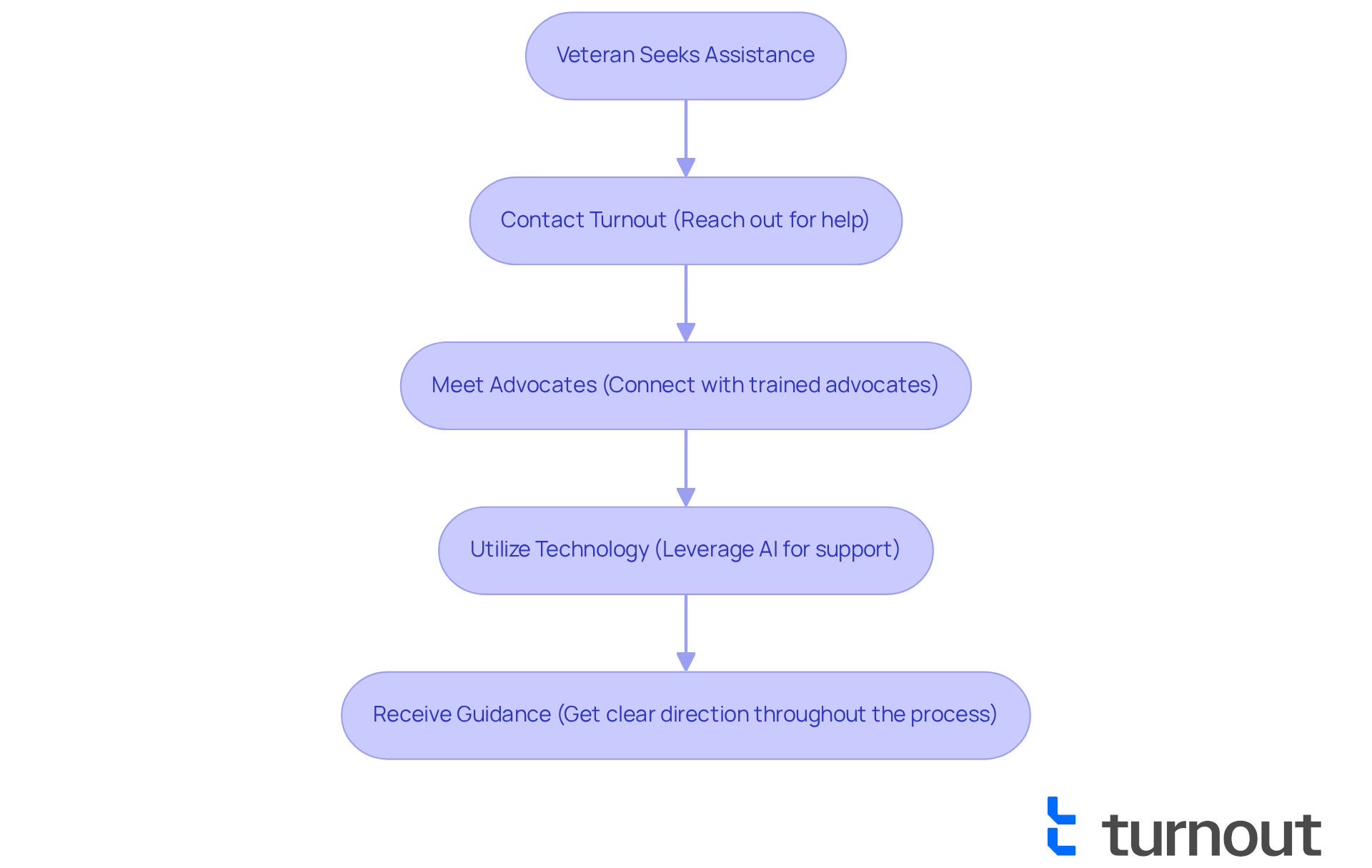
Definition: What is a Medical Nexus Letter?
A medical nexus letter serves as more than just a piece of paper; it’s a vital link between a veteran's current health condition and their military service. We understand that navigating this process can be overwhelming. This correspondence is essential in assisting VA requests, as it provides the medical nexus letter needed to demonstrate that your condition is connected to your service, which is crucial for securing benefits.
It’s important that this medical nexus letter is comprehensive and strongly supported by health-related proof. This support can make a significant difference in the assertion process. You deserve to have your health concerns acknowledged and addressed, and we’re here to help you through this journey. Remember, you are not alone in this process.
Requirements: Key Elements of a Medical Nexus Letter
Crafting a health-related correspondence can feel overwhelming, but we’re here to help. A well-structured document should include several key components that truly make a difference:
- Present a clear statement of the veteran's diagnosis.
- Explain how the condition is linked to military service as outlined in a medical nexus letter. This connection is vital for understanding the context of the health issues at hand.
- Provide a detailed health history that gives insight into the veteran's journey.
- Include supporting evidence from health records to strengthen the case, showing the continuity of care.
- Don’t forget to include the physician's qualifications and contact information. This not only adds credibility but also reassures the reader that they are in capable hands.
By incorporating these elements, you enhance the trustworthiness and impact of the document during the application process. Remember, you're not alone in this journey; we understand the challenges you face, and we’re here to support you every step of the way.
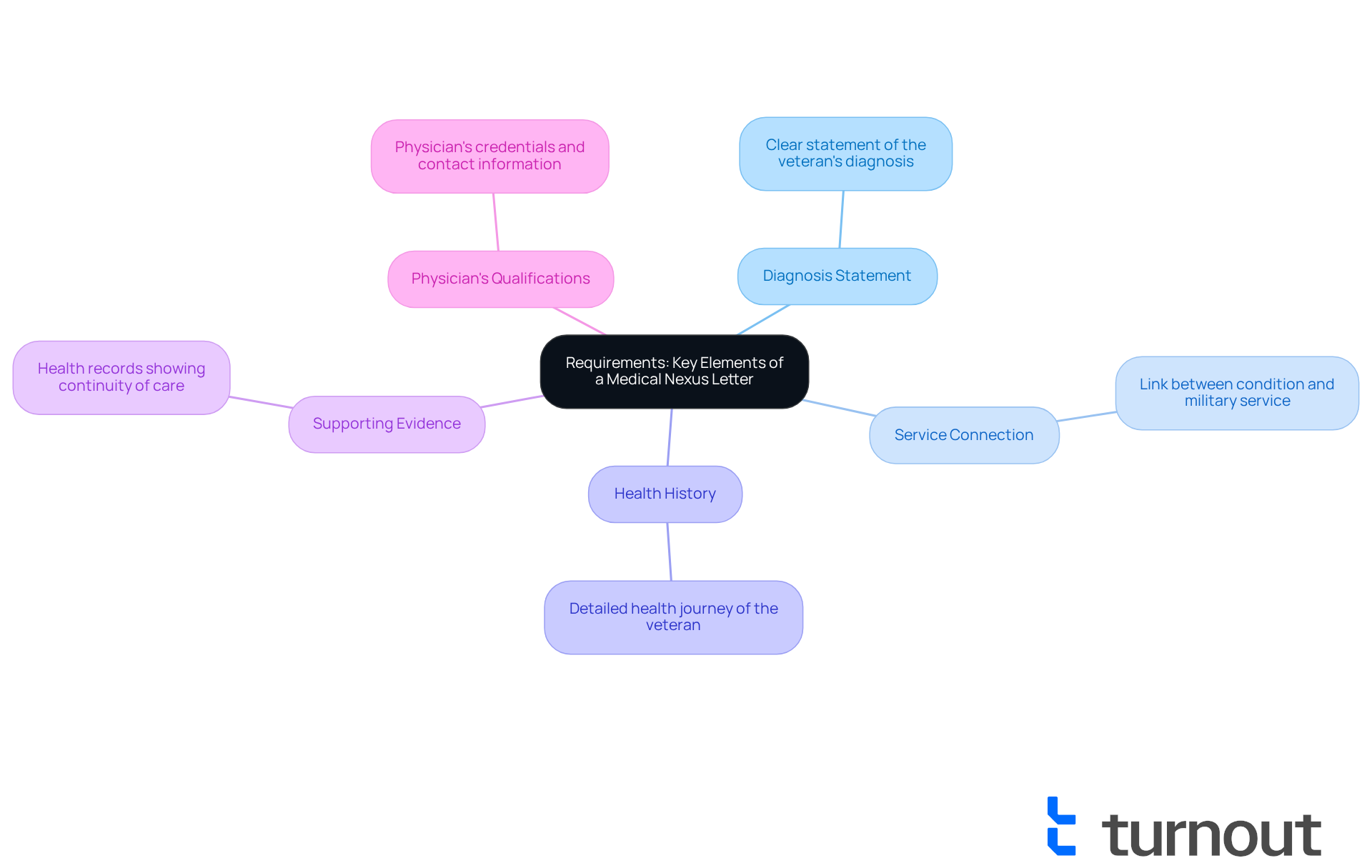
Authorship: Who Can Write a Medical Nexus Letter?
Creating a medical nexus letter is a crucial step for veterans seeking assistance, and it's essential that this letter comes from certified healthcare experts, such as doctors, psychologists, and specialists who understand the veteran's medical history. We understand that the trustworthiness of the writer plays a significant role in the process; correspondence from knowledgeable individuals is often more persuasive. Research indicates that assertions supported by expert correspondence yield higher success rates, significantly improving the chances of a favorable outcome in a VA claim.
It's vital for the writer to grasp not only the veteran's unique circumstances but also to articulate a clear connection to military service. This aligns with the VA's standard of 'as likely as not,' which is critical for establishing the necessary link in the document. Furthermore, the opinion document should provide a detailed account of the veteran's military service and a concise medical history, offering valuable context. Veterans are encouraged to seek specialists who can provide comprehensive insights into their conditions, as the medical nexus letter often serves as pivotal evidence in establishing the required connection for disability benefits.
We also recognize that the cost of obtaining a connection document can vary widely, from several hundred to several thousand dollars. It's important to note that not all primary care physicians are equipped or willing to write such documents for disability claims. Seeking guidance from a VA benefits specialist can be a helpful step for veterans in finding the right healthcare provider for a connection document. Remember, you are not alone in this journey, and support is available to help you navigate these challenges.
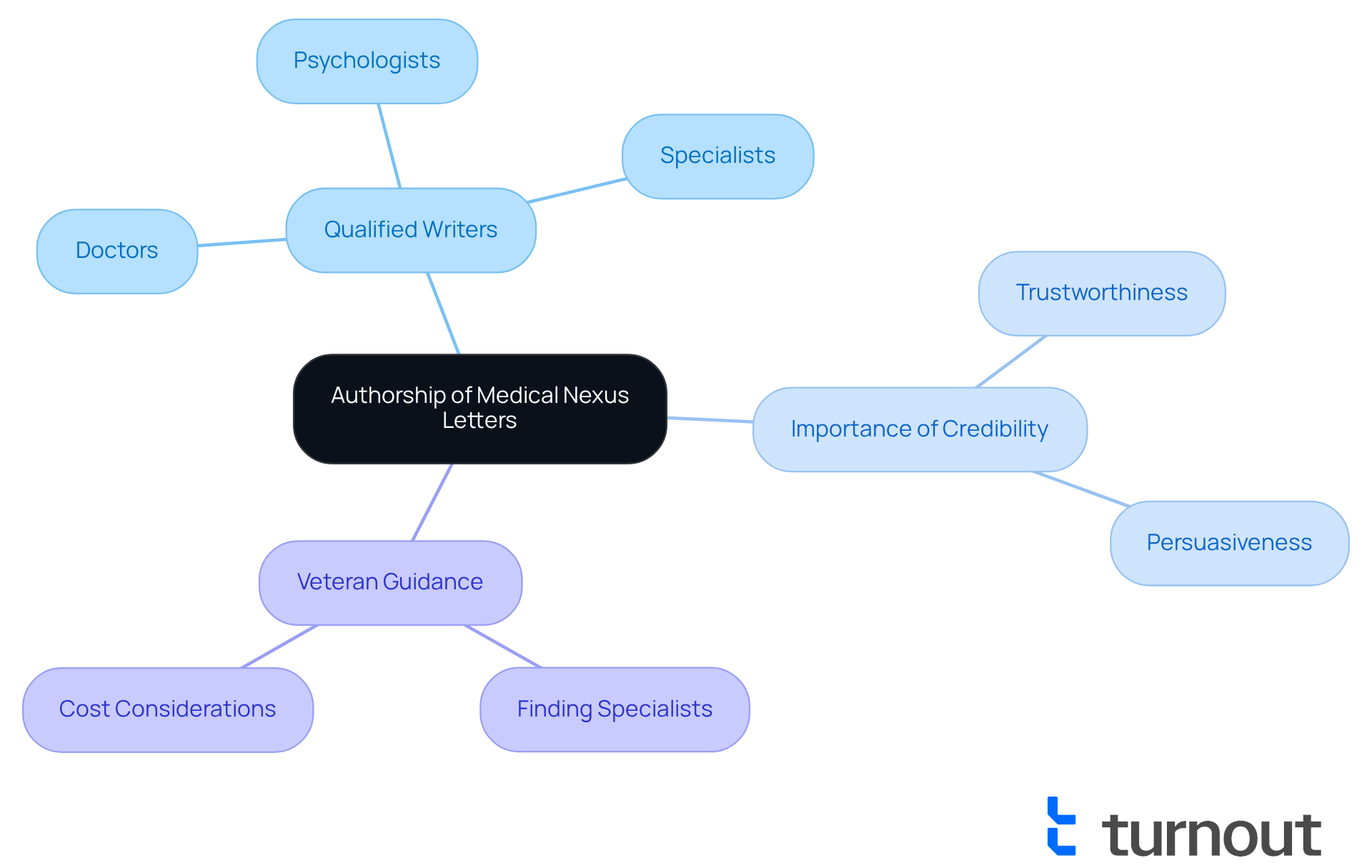
Challenges: What to Do If Your Physician Won't Write a Nexus Letter?
We understand that navigating the healthcare system can be challenging, especially when a doctor is reluctant to write a connection document. If you find yourself in this situation, there are several supportive actions you can take.
- Consider requesting a detailed justification for the refusal. This can help clarify the doctor's perspective and open a dialogue.
- Seek a second opinion from another qualified healthcare provider, which may provide you with additional insights.
- Consult with a disability benefits advocate who can assist in navigating these complexities.
Remember, you are not alone in this journey; there are resources available to help you.
Additionally, gathering supporting documentation can aid in convincing the original doctor to reconsider. Persistence and clear communication are key in these situations. We’re here to help you every step of the way, and together, we can work towards a resolution that meets your needs.
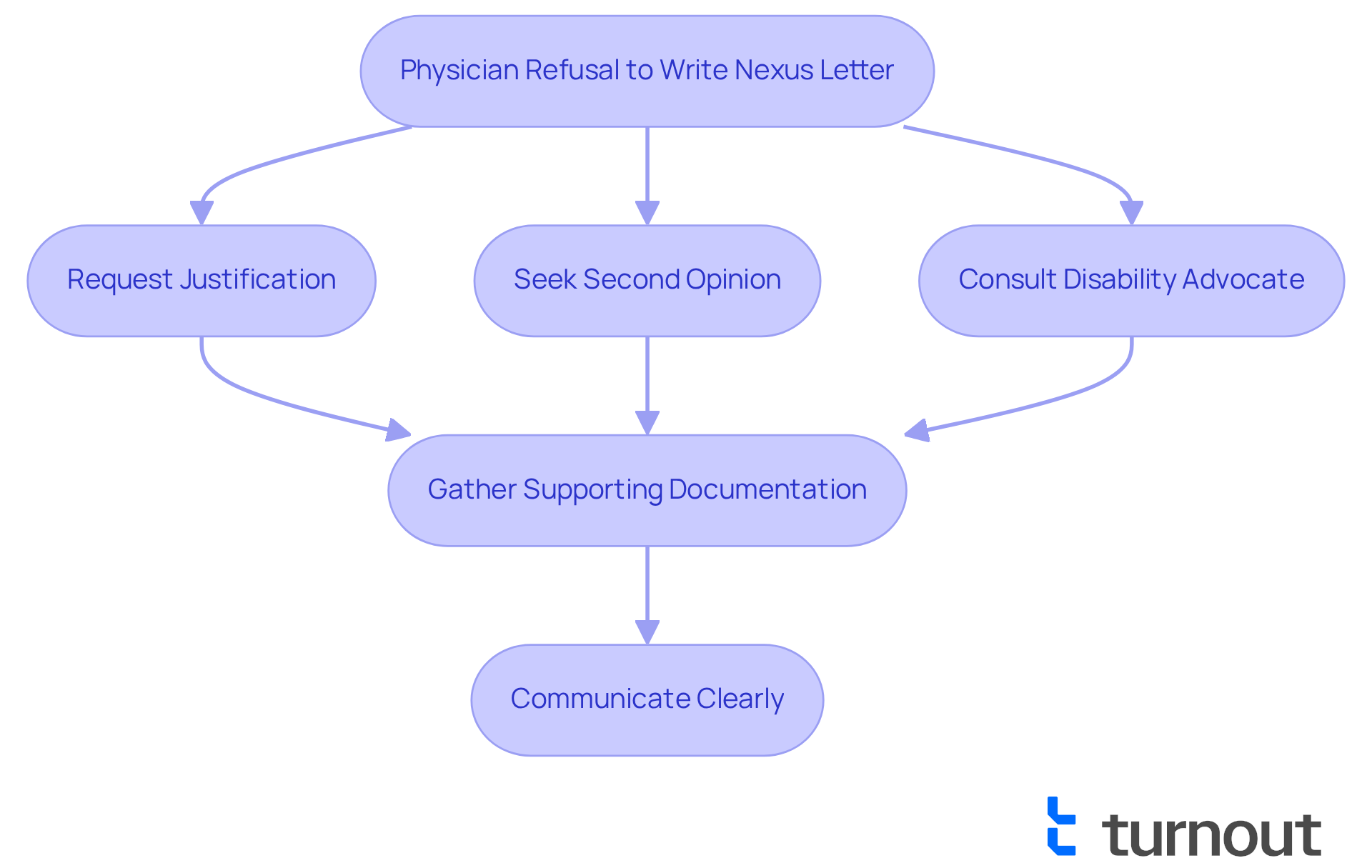
Timing: When Do You Need a Nexus Letter for VA Claims?
When submitting a VA request for disability benefits or appealing a rejected application, a connection document is usually required. We understand that this process can feel overwhelming, and it’s important to acquire the document as soon as possible to prevent delays. Having the connection document ready at the time of submission can significantly improve your chances of a favorable outcome. Remember, you're not alone in this journey; we're here to help you every step of the way.
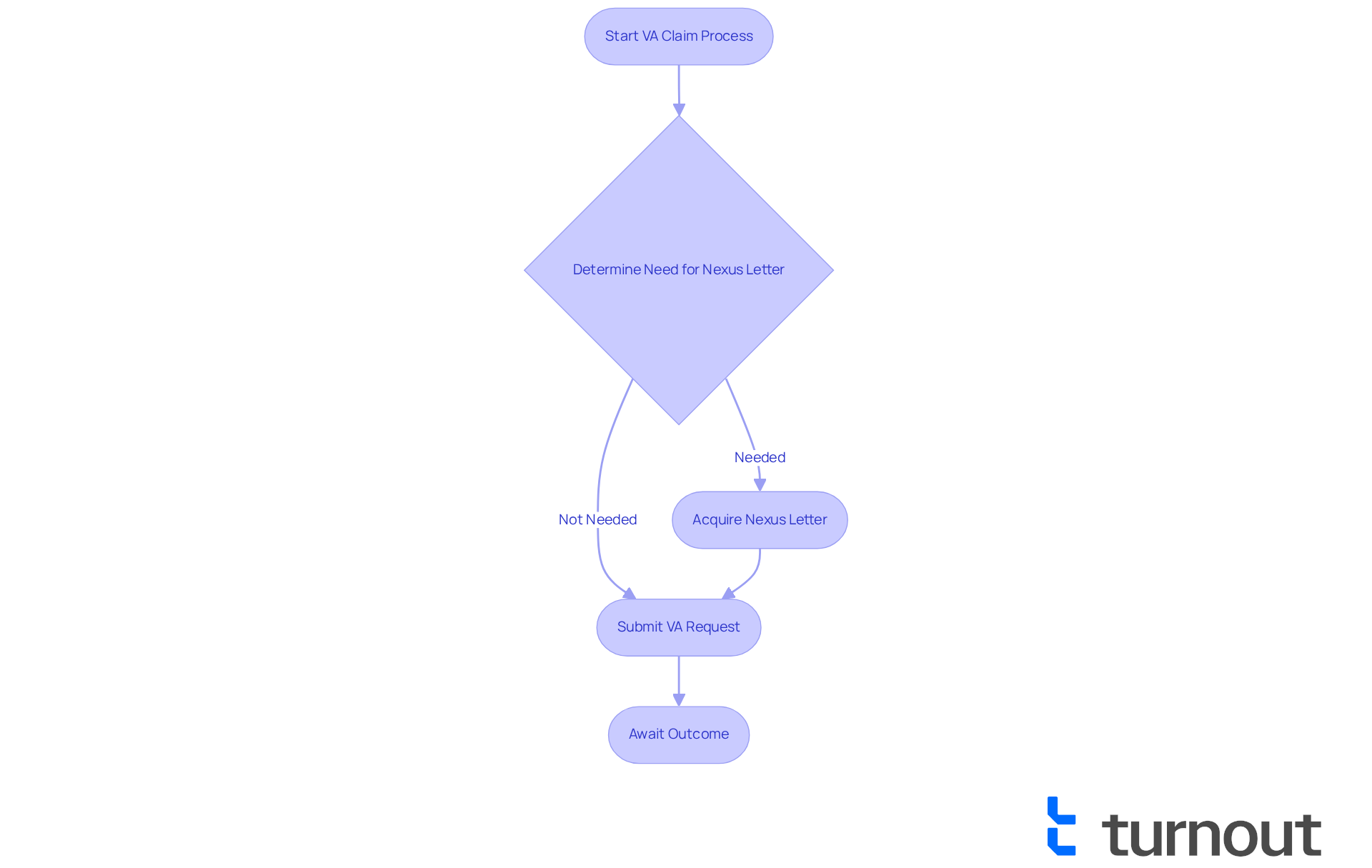
Impact: Does a Nexus Letter Improve Your Chances of Winning an Appeal?
Yes, a carefully crafted connection document can significantly enhance your chances of success in a VA appeal. We understand that navigating this process can be challenging, and this vital document provides the necessary medical evidence to support your claim. It clarifies the relationship between your condition and military service, effectively filling any gaps in your initial assertion with a medical nexus letter. This makes the medical nexus letter an essential element in the appeals procedure.
Research shows that submitting a connection document with your initial claim can expedite the approval process. It creates a clear association between your condition and service. In fact, veterans who include a well-prepared connection document are more likely to succeed in their appeals, especially when addressing previous denial reasons. For instance, connection documents that detail specific military responsibilities and their impact on current health issues have proven to be more influential to VA assessors, leading to increased approval rates.
The costs for connection documents typically range from $500 to over $3,000, with most averaging around $1,500. However, the amount spent should depend on the complexity of your request. A thoroughly crafted connection document can be pivotal in succeeding in an appeal, particularly for veterans whose initial requests were denied. Engaging with knowledgeable supporters who focus on VA processes can enhance your connection document, as they can translate intricate health-related details into the precise terminology required by VA evaluators.
Instances of successful appeals backed by strong documentation highlight the importance of detailed medical nexus letters that establish a link between military service and health issues. By providing comprehensive documentation and a clear rationale, you can significantly improve your chances of a favorable outcome in the appeals process. Remember, you are not alone in this journey; we’re here to help.
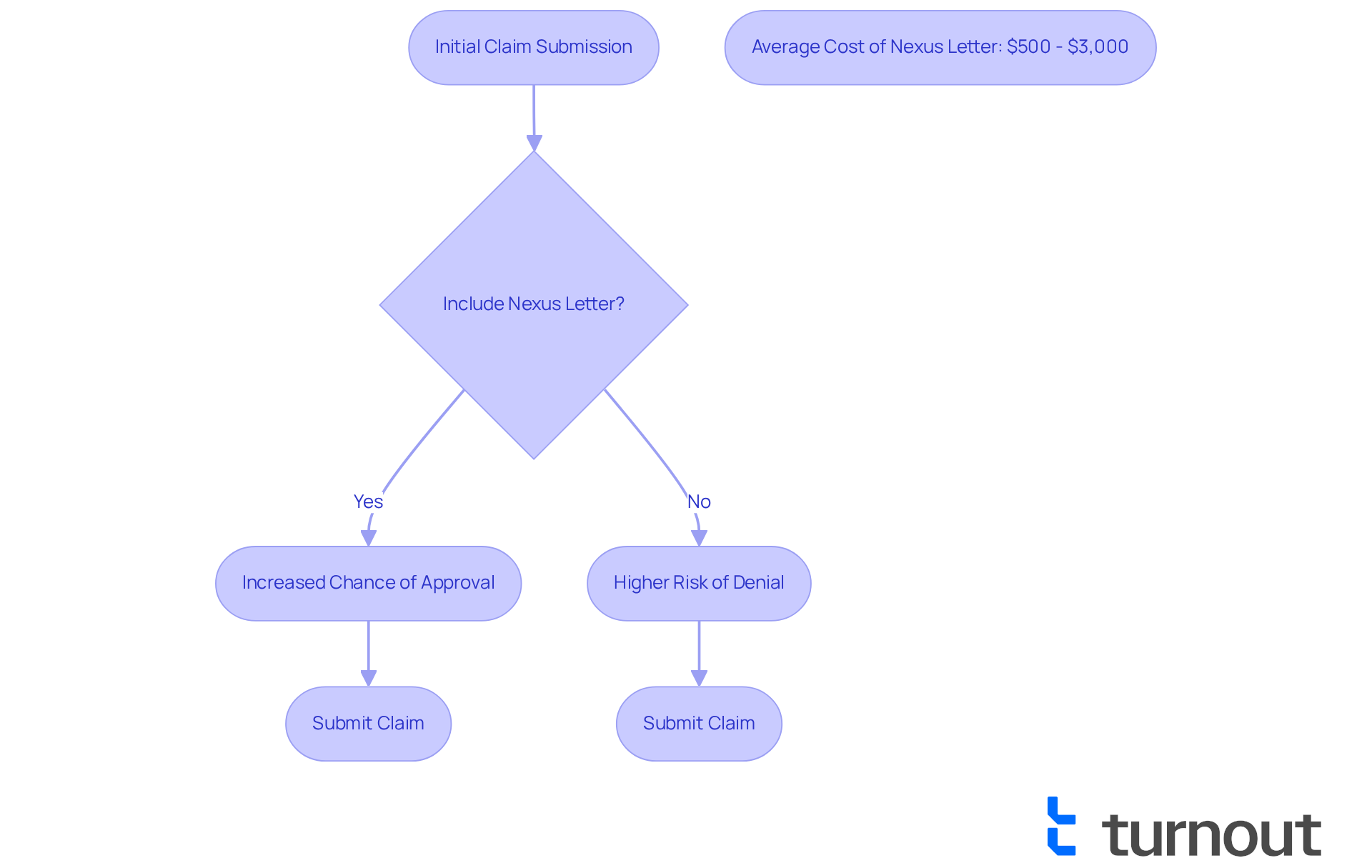
Submission: When Should You Submit Your Nexus Letter?
Veterans, we understand that navigating the process of contesting a ruling can be daunting. It’s crucial to provide your connection document with your initial submission or as soon as feasible. This document must be part of your request file for the VA to review it properly. Delaying your submission can lead to unnecessary complications and even a potential denial of benefits.
Statistics show that submitting essential evidence too late can add months or even years to the time it takes to receive disability compensation. For instance, veterans who submitted their medical nexus letter promptly often experienced more streamlined processes and higher approval rates, as highlighted in a case study on the importance of the medical nexus letter for VA applications.
It's common to feel overwhelmed, but waiting for a rejection notice before seeking an independent health assessment can disrupt your VA disability request. A well-timed submission not only strengthens your case but also helps establish a clear connection between your condition and military service, which is vital for obtaining a medical nexus letter that contributes to a favorable outcome.
To enhance the impact of your document, consider seeking advice from a healthcare professional experienced in VA matters. Additionally, take the time to review your document for thoroughness before submission. Remember, you are not alone in this journey; we’re here to help you every step of the way.
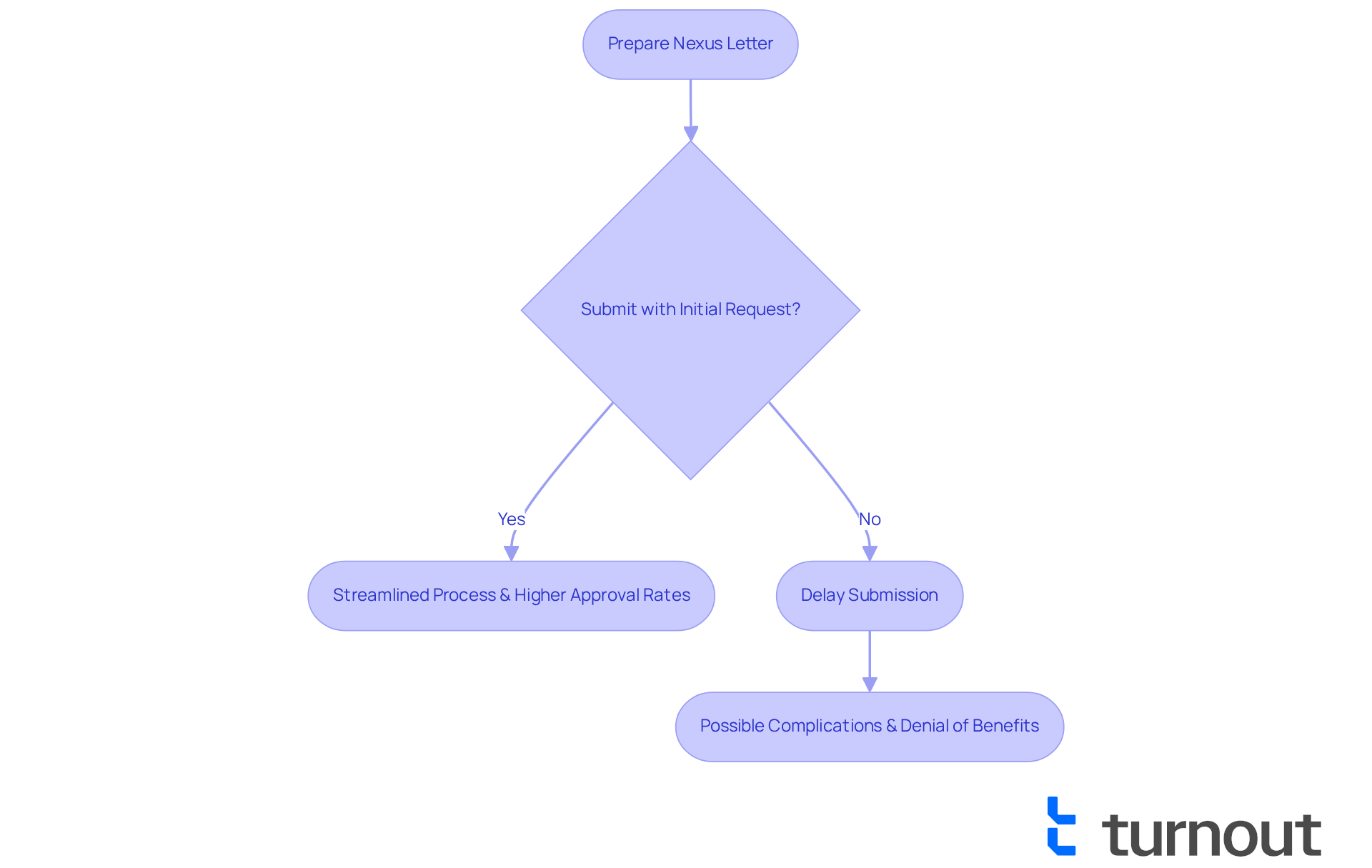
Next Steps: What to Do If Your VA Claim is Denied With a Nexus Letter?
If your VA request has been rejected, even with a connection document, it’s important to know that you’re not alone. We understand that this can be a frustrating experience. Here are some steps you can take to navigate this situation:
- Thoroughly examine the rejection notice to understand the specific reasons for the denial. This knowledge is crucial.
- Collect additional proof or documentation that may strengthen your request, such as updated health records or new connection documents.
- Consider seeking advice from a Veterans Service Officer (VSO) or a qualified expert who can help you through the appeal process effectively.
- Remember to submit your appeal within one year from the date of rejection. Missing this deadline can lead to your request being closed.
Understanding the reasons for denial is vital for addressing any shortcomings in your submission. Many veterans have successfully contested refusals by modifying their connection documents to include a medical nexus letter that ensures thoroughness and is supported by strong health evidence. Additionally, incorporating buddy statements or personal testimonies can significantly bolster your claims by supporting in-service events or symptoms.
By staying organized and proactive, you can greatly improve your chances of a successful appeal. Remember, we’re here to help you every step of the way. You are not alone in this journey.
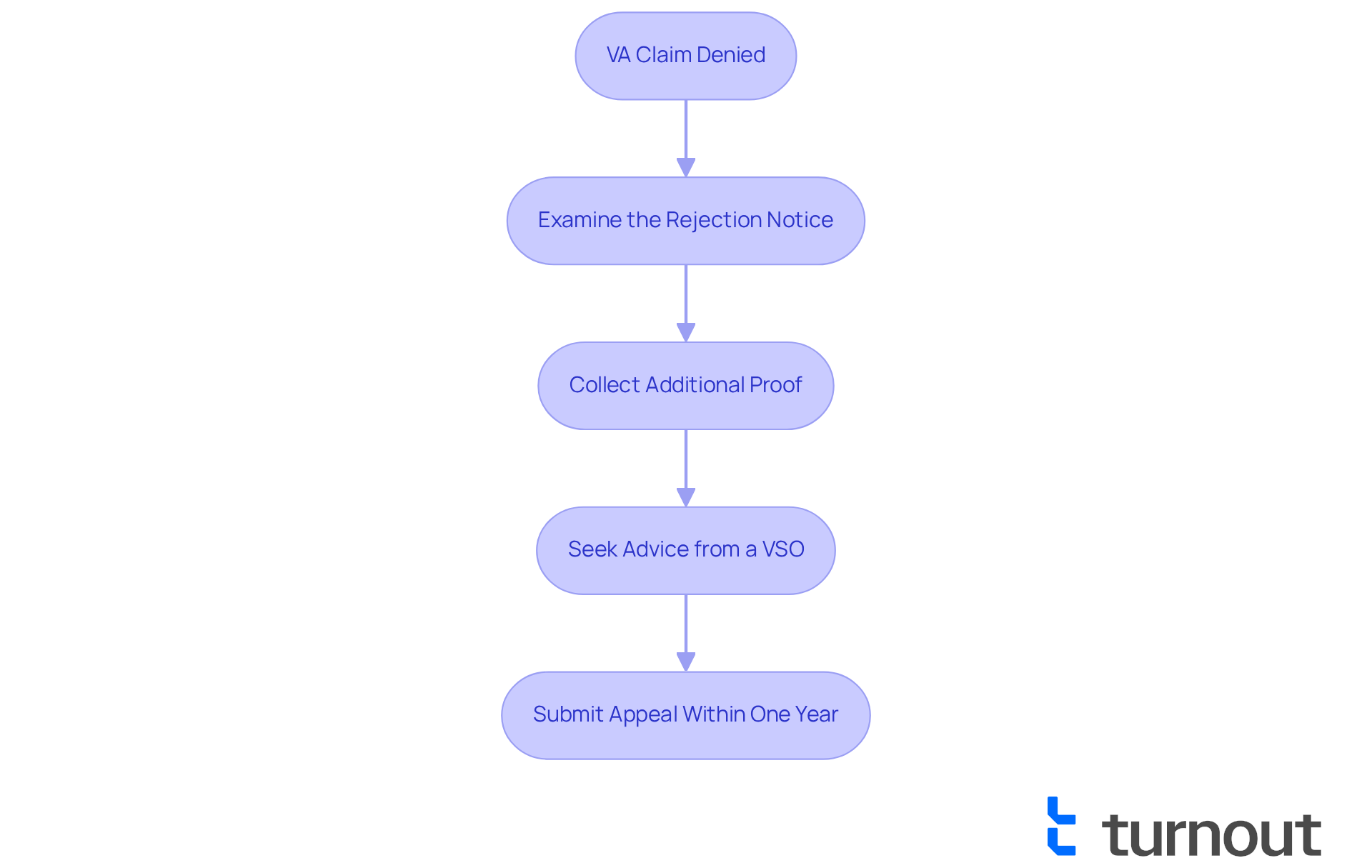
Example: Sample Medical Nexus Letter for VA Disability Claims
Below is a sample medical nexus letter for VA disability claims:
[Physician's Name]
[Physician's Address]
[Date]
To Whom It May Concern,
I am writing to provide a medical nexus letter for [Veteran's Name], who has been under my care since [Date]. [Veteran's Name] has been diagnosed with [Diagnosis], which I believe is directly related to their military service.
Based on my evaluation and review of [Veteran's Name]'s medical history, it is my professional opinion that their condition is a result of [specific details linking the condition to military service], as detailed in the medical nexus letter.
Please feel free to contact me at [Physician's Phone Number] for any further information.
Sincerely,
[Physician's Signature]
[Physician's Credentials]
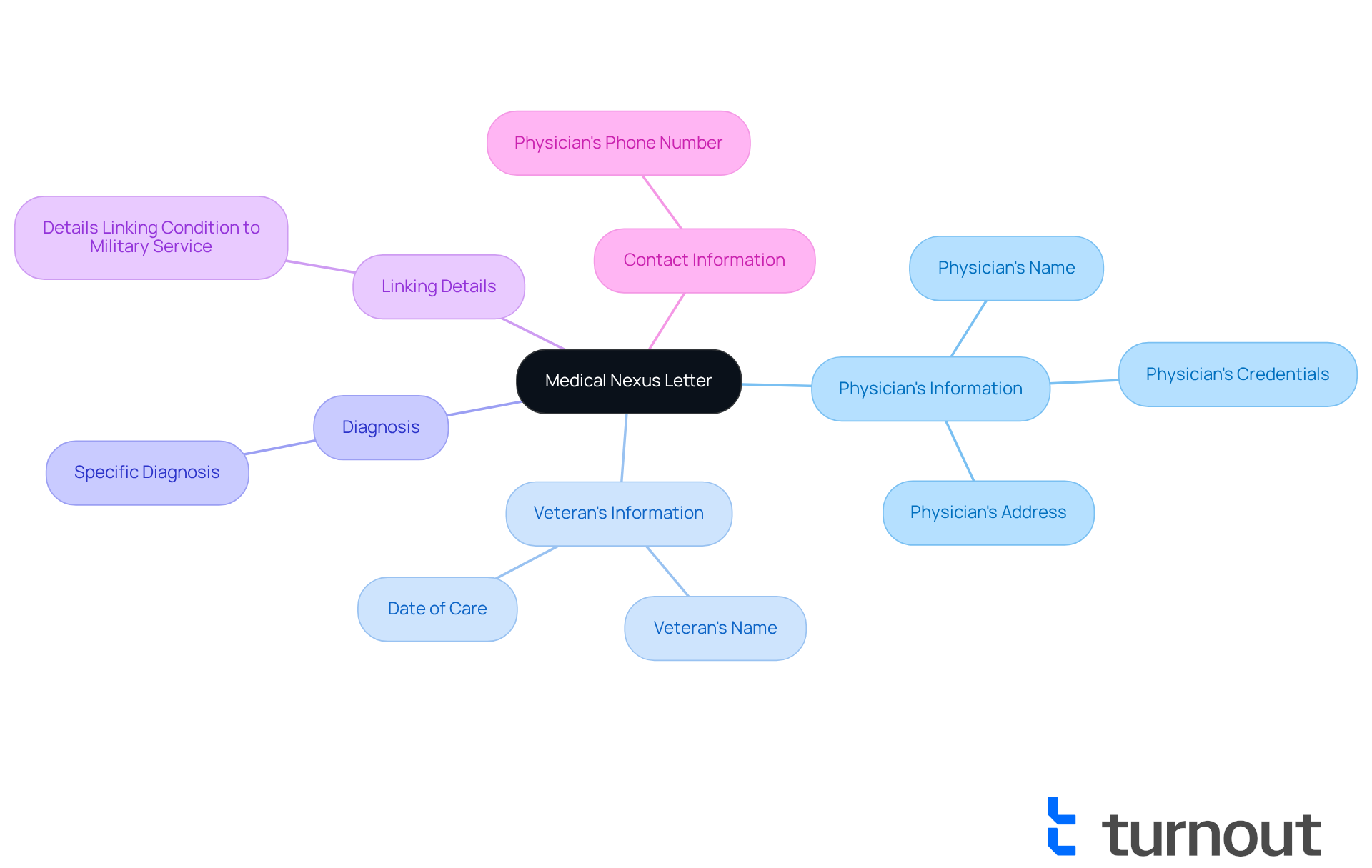
Conclusion
Navigating the complexities of obtaining a medical nexus letter can feel overwhelming for veterans seeking the benefits they have rightfully earned through their service. This essential document not only establishes a vital connection between a veteran's health condition and military service but also plays a significant role in the success of VA claims. We understand that grasping the process, requirements, and importance of timely submission can empower veterans to effectively advocate for their health and well-being.
In this article, we have highlighted key points, including:
- The definition and significance of a medical nexus letter
- The essential elements that must be included
- The qualifications of those who can write such letters
We've also discussed strategies for overcoming challenges, such as a physician's reluctance to provide a nexus letter, as well as the critical nature of timely submission in the claims process. These insights are designed to equip veterans with the knowledge they need to navigate the VA claims process more effectively.
Ultimately, the journey to obtaining a medical nexus letter and securing VA benefits does not have to be a solitary one. By leveraging available resources and support systems, veterans can enhance their chances of a successful claim. It is vital to remain proactive and informed, ensuring that every step taken is aimed at achieving the benefits that are rightfully deserved. Remember, the path to advocacy is a shared one, and support is always at hand to guide you through this important process.
Frequently Asked Questions
What is the purpose of Turnout in assisting veterans?
Turnout aims to simplify the process of obtaining essential healthcare connection documents, such as medical nexus letters, for veterans seeking benefits by utilizing cutting-edge technology and a dedicated team of trained advocates.
What is a medical nexus letter?
A medical nexus letter is a vital document that links a veteran's current health condition to their military service, which is essential for assisting with VA requests and securing benefits.
Why is a medical nexus letter important for veterans?
It helps demonstrate that a veteran's health condition is connected to their military service, which is crucial for obtaining benefits from the VA.
What are the key elements that should be included in a medical nexus letter?
A medical nexus letter should include a clear statement of the veteran's diagnosis, an explanation of how the condition is linked to military service, a detailed health history, supporting evidence from health records, and the physician's qualifications and contact information.
How can a well-structured medical nexus letter impact the application process?
Incorporating key elements into the medical nexus letter enhances its trustworthiness and impact, making it more effective during the application process for benefits.
How does Turnout support veterans in the application process?
Turnout provides timely assistance and clear direction throughout the application process, helping veterans navigate the complexities of healthcare access and ensuring their health concerns are acknowledged and addressed.




